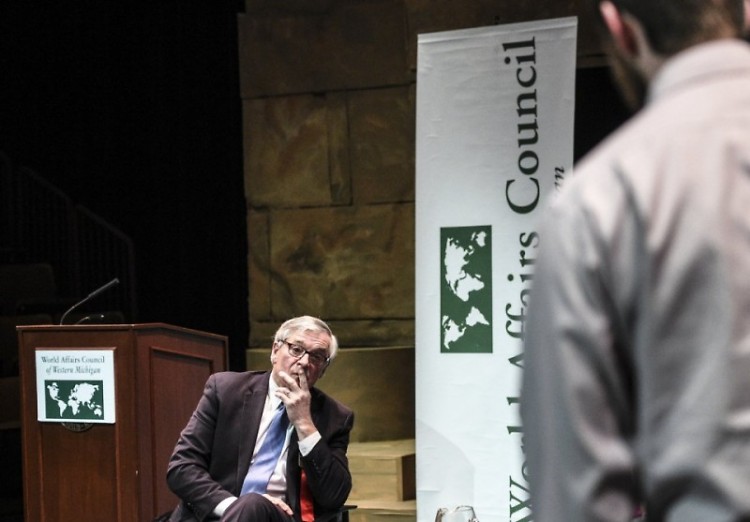Is the United States and our neck of the woods, Grand Rapids, a welcoming place? Rhetoric within national election coverage as well as ongoing concerns over refugee placement nationwide certainly suggest a debate on how welcoming we should be. How we respond to immigrants and ethnic and religious diversity in general says much about our national character.
Is the American character changing? Though 70 percent of Americans believed in 2012 that the U.S. should prevent mass atrocities worldwide, according to a study by the United States Holocaust Memorial Museum, is this number still an accurate reflection of our beliefs and values?
In a recent address on genocide prevention sponsored by the World Affairs Council of Western Michigan, Dr. Brett O’Bannon, Director of the Conflict Studies Program at DePauw University expresses his concern over increasing “genocidal rhetoric in the US.” Genocide in its preliminary stages can often begin with the notion of “othering.” This concept refers to one’s mentality that a group of people are not considered complex individuals with individual thoughts and emotions, but rather classified as “not one of us.” How often in our own communities do we participate, even subconsciously, in “othering?” How do we prevent this way of thinking in our communities?
Dr. O’Bannon visited Western Michigan to participate in the World Affairs Council’s Great Decisions Global Discussion Series, an annual event that runs Monday evenings in February and March at Aquinas College’s Performing Arts Center. Great Decisions focuses on eight of the most critical foreign policy topics affecting American politics.
The World Affairs Council invites the public to become part of this ongoing foreign policy conversation as experts discuss:
March 14th
Korean Reunification
Featuring Dr. James Person, Deputy Director of the History and Public Policy Program at the Woodrow Wilson International Center for Scholars in Washington, D.C.
At the end of World War II, Korea was divided in two. Today, North and South Korea couldn’t be further apart. Concerns over North Korea’s supposed hydrogen bomb testing has created heightened tensions between North Korea and the world. Dr. Person discusses whether North and South Korea might ever be able to reconcile differences and emerge once more as a unified country.
March 21st
ISIS and the New Terror Spectacular
Featuring Patrick Skinner, former CIA case officer and Director of Special Projects for the Soufan Group in New York City
Patrick Skinner is a consultant from the Soufan Group (Ali Soufan was the FBI Special Agent investigating international terrorism cases after 9/11). He brings a fresh perspective to address the dangers ISIS poses to U.S. interests. Born out of an umbrella organization of Al-Qaeda in Iraq, the so-called Islamic State in Iraq and Syria (ISIS) burst onto the international stage in December 2013. Since then, the group has seized control of a number of critical strongholds and declared itself a caliphate. He discusses the group’s newest type of terrorism, which he calls “the new terror spectacular.”
March 28th
An Insider’s Guide to Cuba
Featuring Ambassador Charles Shapiro, former Coordinator for Cuban Affairs
After decades of isolation, the U.S. is taking major steps to normalize relations with Cuba. Most Americans don’t know that before diplomatic relations were restored in July 2015, the U.S. had maintained a presence in Cuba. Ambassador Shapiro served as a former Coordinator to Cuba. He still maintains a wide circle of high-level connections, giving him insight into the future of U.S.-Cuba relations.
When you attend Great Decisions, you are given the opportunity to engage in Q&A sessions with the speakers...become part of the conversation in Western Michigan by asking questions on some of the most important issues facing our world today.
No reservations are needed to attend and admission to the event is $10. There is free convenient parking at Aquinas College’s Performing Arts Center. You may also sign up for a free membership or learn more about the World Affairs Council here.
The Rapidian, a program of the 501(c)3 nonprofit Community Media Center, relies on the community’s support to help cover the cost of training reporters and publishing content.
We need your help.
If each of our readers and content creators who values this community platform help support its creation and maintenance, The Rapidian can continue to educate and facilitate a conversation around issues for years to come.
Please support The Rapidian and make a contribution today.
